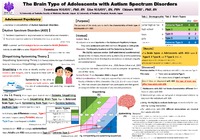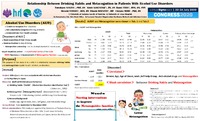The brain type of adolescents with autism spectrum disorders
View File(s)
- Author(s)
- Details
-
Tomokazu Sugaya, PhD, RN; Chizuru Mori, PhD, RN -- Faculty of Medicine, Division of Health Innovation and Nursing, University of Tsukuba, Tsukuba City, Ibaraki, Japan; Eiko Sugaya, BN, RN, Nursing Department, University of Tsukuba Hospital, Tukuba City, Ibaraki, Japan
- Sigma Affiliation
- Phi Omicron
- Contributor Affiliation(s)
- University of Tsukuba, Tsukuba City, Ibaraki, Japan
Visitor Statistics
Visits vs Downloads
Visitors - World Map
Top Visiting Countries
| Country | Visits |
|---|
Top Visiting Cities
| City | Visits |
|---|
Visits (last 6 months)
Downloads (last 6 months)
Popular Works for Sugaya, Tomokazu by View
| Title | Page Views |
|---|
Popular Works for Sugaya, Tomokazu by Download
| Title | Downloads |
|---|
View Citations
Citations
The purpose of this study is to clarify the characteristics of brain type of adolescents with ASD. It was investigated with EQ-SQ. The brain types were no extreme Type S. This suggests that the type of brain may differ from adults with ASD.
29th International Nursing Research Congress: Innovative Global Nursing Practice and Education Through Research and Evidence-based Practice, July 19-23, 2018. Melbourne, Australia.
Items submitted to a conference/event were evaluated/peer-reviewed at the time of abstract submission to the event. No other peer-review was provided prior to submission to the Henderson Repository, unless otherwise noted.
| Type | Poster |
| Acquisition | Proxy-submission |
| Review Type | Abstract Review Only: Reviewed by Event Host |
| Format | Text-based Document |
| Evidence Level | N/A |
| Research Approach | N/A |
| Keywords | Brain Type; Autism Spectrum Disorders; Adolescents |
| Name | 29th International Nursing Research Congress |
| Host | Sigma Theta Tau International |
| Location | Melbourne, Australia |
| Date | 2018 |
All rights reserved by the author(s) and/or publisher(s) listed in this item record unless relinquished in whole or part by a rights notation or a Creative Commons License present in this item record.
All permission requests should be directed accordingly and not to the Sigma Repository.
All submitting authors or publishers have affirmed that when using material in their work where they do not own copyright, they have obtained permission of the copyright holder prior to submission and the rights holder has been acknowledged as necessary.
Related items
Showing items related by title, author, creator and subjects.
-
The relationships among AQ, self-affirmation, and self-esteem in adolescents with autism spectrum disorder
Sugaya, Tomokazu; Sugaya, Eiko; Mori, ChizuruThe purpose of this study is to clarify the relationship among AQ, self-affirmation, and self-esteem in adolescents with ASD. It was shown that AQ and self-affirmation had a negative correlation, and a positive correlation ... -
Effects of activity group therapy for children with ASD on social skills and self-esteem
Sugaya, Tomokazu; Shimada, Tomoko; Ogiwara, Kaori; Sakurai, Akio; Anzai, Hayato; Kudo, Fujiko; Aoki, Momoko; Mori, Chizuru (2017-07-27)The purpose of this study is to clarify the utility of Activity Group Therapy with same interests (Railway) for children with ASD. Comparison of before and after has been carried out on social skills and self-esteem. There ... -
Relationship between drinking habits and metacognition in patients with alcohol use disorders
Sugaya, Tomokazu; Kaneshige, Kimie; Toda, Ikumi; Yamada, Hiroshi; Maesato, Hitoshi; Mori, ChizuruThe purpose of this study is to clarify the relationship between drinking habits and metacognition in patients with alcohol use disorders. A self-administered questionnaire survey was conducted on 118 psychiatric outpatients ... -
Relationship between middle school students' social skills and their characteristics in child and adolescent psychiatry
Sugaya, Tomokazu; Mori, Chizuru (2016-07-13)Session presented on Friday, July 22, 2016 and Thursday, July 21, 2016: Introduction: In child and adolescent psychiatry, children were visited suffering from various difficulties of daily life. 45% of patients came to a ... -
Characteristics of work engagement in Japanese female nurses
Ozawa, Rikako; Sugaya, Tomokazu; Mori, ChizuruJapanese nurses' work engagement improves with age. However, the work engagement scoreare low compared to other countries.This is because it reflects the Japanese tendency of Japanese to suppress positive emotions. When ...





